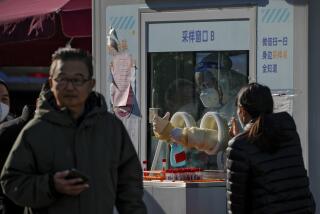No ‘Breakthrough’ in China Reform
- Share via
SHANGHAI — China’s release of Song Yongyi last week elicited the usual cliches from Washington.
Song, a Chinese national who is awaiting U.S. citizenship, had been imprisoned since returning to his homeland for a visit in August. A librarian and scholar at Pennsylvania’s Dickinson College, he had run afoul of Chinese authorities when he began collecting materials about the Cultural Revolution. China let him go as a gesture to the United States at a time when Congress is preparing for a milestone vote this year on granting China permanent trade benefits.
“This breakthrough is proof that engagement [with China] works,” exulted Rep. Matt Salmon (R-Ariz.). “I hope this will convince opponents of normal trade relations that open and honest engagement is the best course for both the United States and China.”
Really? Hold the cheers. We can congratulate Salmon, Sen. Arlen Specter (R-Pa.) and the many other U.S. officials and American scholars who worked hard and effectively on Song’s behalf, without accepting the faulty logic of the political message Salmon offered.
A thoughtful person might ask two questions about the Song case:
1) What kind of government or system would arrest an innocuous archivist such as Song in the first place?
2) Doesn’t Song’s release give credence to the arguments by U.S. human rights groups that Congress should preserve some sort of opportunity to debate and vote on China policy--if not on trade benefits, then on something else of significance?
Consider: China released Song because it was nervous about impending congressional votes (on both trade and Taiwan). If Congress makes China’s trade benefits permanent and has no other regular review of China policy, then China won’t care so much what legislators such as Salmon and Specter think.
At that point, the pressure from Capitol Hill will be off. And people like Song will find it harder to get out of jail.
Song’s detention was yet another sign that China’s political system isn’t changing as fast as its economic system.
China desperately needs political liberalization. It’s not just Westerners who perceive that fact. A week of interviews here and in Beijing makes clear that some Chinese are more acutely aware than outsiders of the dangers of their country’s political sclerosis.
“I’m not like the dissidents. To try to overthrow the government makes no sense,” said one Chinese intellectual, too nervous to be quoted by name. “But we are coming to a crossroads. It’s time we should carry out political reform along with economic reform. If we don’t move soon, if we just wait, then it will be more dangerous later on.”
What he meant was this: Some people in China are getting rich. Lots of others aren’t. The next big political movement in China, whether two years or two decades from now, will probably be a revolt by the have-nots against the haves.
In a democracy, such political dissent is legitimized, channeled, compromised or co-opted. In China’s still-Leninist political system, it’s not. There’s no safety valve. And so dissent by even a tiny minority becomes a threat to Communist Party rule.
In Beijing and Shanghai, one can find a few mildly hopeful signs. Many Chinese, even semi-official ones, no longer attack the concept of democracy but portray it as a goal for the distant future.
“We [China and the United States] may have our differences on questions of democracy and human rights,” said Chu Shulong of the China Institute of Contemporary International Relations. “But that’s only a difference on timing.”
In private, some knowledgeable Chinese intellectuals can even lay out a detailed strategy for gradually democratizing China’s political system.
It is said that the first step would be to cut loose state enterprises and make them dependent on the market--thus reducing the size of the Chinese government and scaling back the huge constituency opposed to political change.
Next, China would open the way for political participation by giving much greater freedom to the press and to legislatures. And finally, China would bring electoral politics and democratization--now being permitted only in a controlled way in Chinese villages--to higher and higher levels of government and within the Communist Party itself.
Such a scheme sounds impressive; but, as usual in China, it’s hard to tell now whether it is a plan for political reform, or will be used as a prescription for delaying any serious changes for decades.
Chinese President Jiang Zemin shows no sign he’s interested in altering the political system. And so some Chinese are pinning their hopes on the group of leaders who follow him--known as the “fourth generation” because it will come after the eras of Mao Tsetung, Deng Xiaoping and Jiang.
“Maybe this [political liberalization] is the historic mission of the fourth generation,” said one Chinese scholar.
Maybe. Or will people like Song be locked up and released at whim for still another generation or two?
Jim Mann’s column appears in this space every Wednesday.
More to Read
Sign up for Essential California
The most important California stories and recommendations in your inbox every morning.
You may occasionally receive promotional content from the Los Angeles Times.










